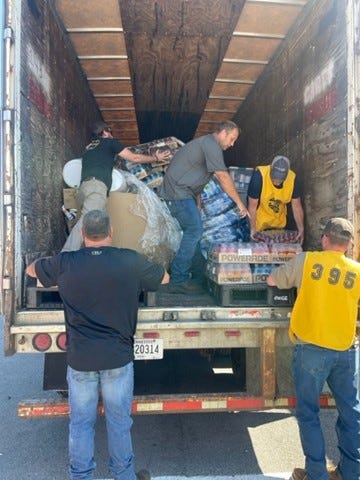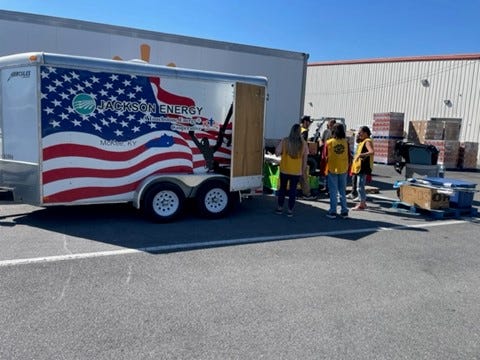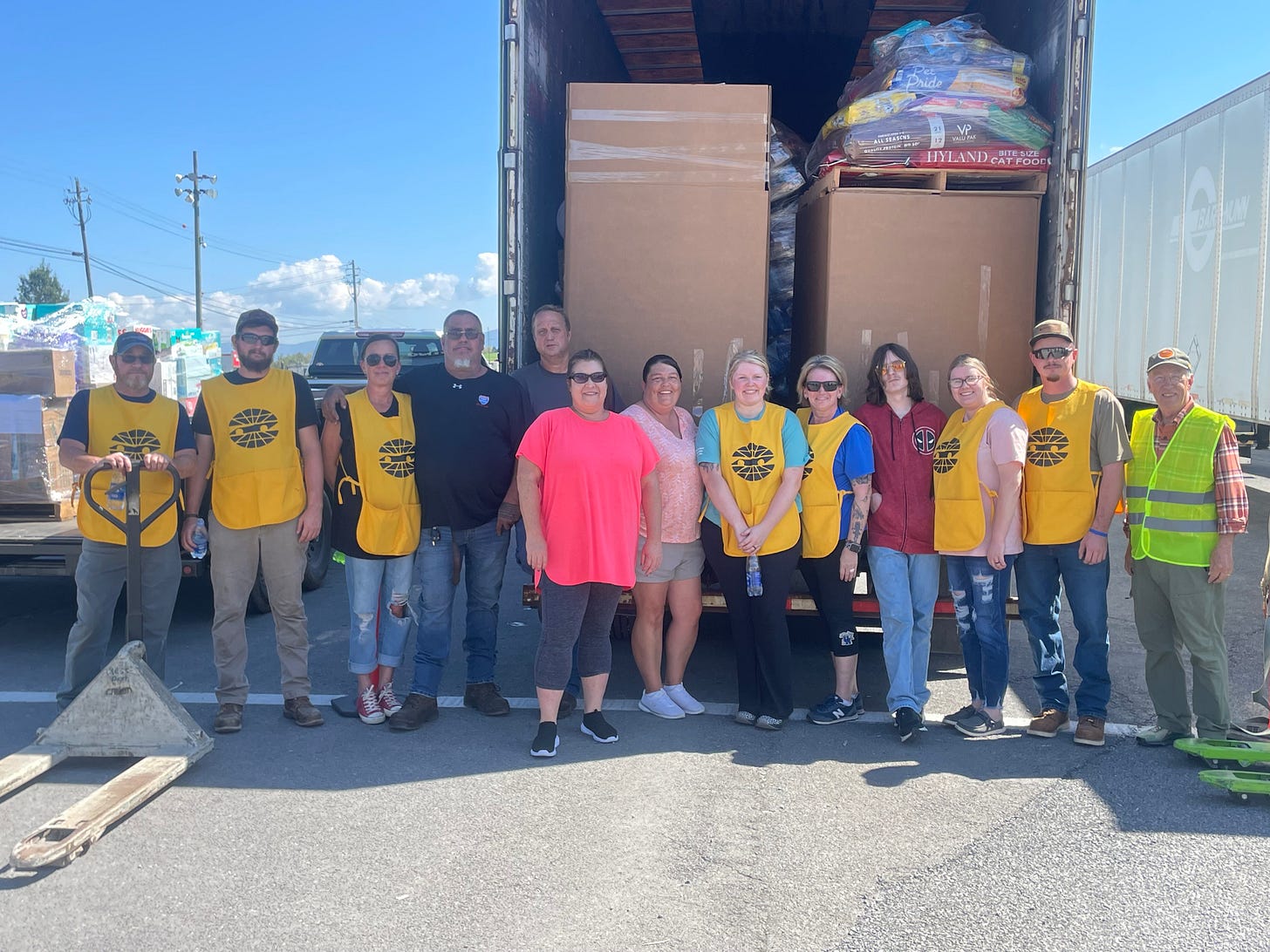We are bombarded daily with scenes and news of anarchy, destruction, and of a world and a country seemingly sliding into the abyss. Multiple wars in the Middle East and Europe; governments adrift in European cities; an increasingly aggressive China on the move across the globe; rampant inflation here in the U.S.; a near–civil war in what sometimes seems like a hopelessly divided country; and a death-dealing hurricane that has destroyed homes and businesses and killed a still unknown number of people.
Thus, although there are plenty of reasons to be pessimistic, there are signs of hope. Here at home, the search for hope sometimes seems difficult. But if you look, you can see that the American spirit still lives — you just have to look in the right places. Today you can see this in relief operations organized and supported by private citizens to help fellow citizens who have been caught in the destruction wrought by Hurricane Helene
This article describes one such effort. Below is a photo and the story of a small group of such people and how they have pitched in to help the victims of the unprecedented devastation caused by the mountain floods caused by the hurricane. Although I will focus on the contributions of this one small group, remember that there are hundreds and even thousands of common, ordinary Americans like them who have made similar contributions. I do not mean to downplay any of their efforts.
A grassroots effort — “Just good people trying to do the right thing.”
The story comes to me from Will Brownlow, a long-time friend and fishing buddy who lives in Knoxville. Will is what we would call a “small businessman” who, among other things, owns three large warehouses in London Kentucky. London is a small town of less than 10,000 people in southeast Kentucky. Will leases space in these warehouses to commercial and industrial businesses that need extra storage space for goods, equipment, inventory, and the like.
Lori Nichols is one of Will’s employees. She came to work for him when she was fifteen and has stayed for thirty years. Last week Lori and her daughter-in-law, Madison Nichols, were discussing the plight of the tens of thousands of people whose lives have been devasted by Hurricane Helene. Although they are not in the area of destruction, they said, “We need to do something.”
The next day Lori and Madison began to make calls and send emails to friends and families. They asked Will if they could use his warehouses to store donations temporarily and his tractor trailer to transport them. Will agreed immediately.
They then began contacting more friends and others. They posted messages on Facebook, Instagram and other social media. They called local pastors who, in turn, got the word out to their congregations, asking both for financial support and donations of food, clothing and other needed supplies. The word spread like wildfire throughout the community and elsewhere. Monetary donations began to pour in. People began showing up at Will’s warehouses in cars, pick-up trucks and even trucks pulling small trailers to drop off much needed supplies. In Will’s words, “people just stepped up and donations spiraled.”
Will realized that they were getting enough donations to completely fill up his tractor trailer plus another similar-sized load that they could transport in trucks with smaller trailers. So far, all told, they have the equivalent of three full tractor trailer loads.
Who gets the credit?
Will provided the tractor trailer rig, plus his warehouses and other key support. It would be easy to give him credit for organizing and implementing this effort. But when I asked him if he had any comments he wanted to add, this is what he said of Lori and Madison.
They are the two who came up with the idea and spearheaded the whole thing. They get all the credit.
“You never know who is going to be generous.”
Help sometimes came from unexpected quarters. Will and the others were buying most of the daily necessities that the victims needed from Dollar General stores. If there are any readers who are not familiar with Dollar General, Will described it as “a counterpart to Waffle House, just good ol’ country people working there, trying to make a living.”
Will and others were at a local Dollar General buying clothes, diapers, soap, cooking utensils and other basic necessities that the flood victims did not have. The cashier naturally asked him why they were buying so much stuff, essentially clearing the shelves for everything they needed. Will explained that they were buying relief supplies for the hurricane victims. The cashier’s response? She wanted to contribute $50 on the spot to support their efforts. Now some readers may think that a $50 donation is small potatoes, but it was not. Although I do not know her exact income, Dollar General cashiers reportedly average about $16.47 per hour. That works out to slightly less than $659 per week, before taxes, social security and other deductions. So, her salary left precious little money for discretionary spending. $50 was a significant donation for the cashier.
Will initially declined her offer, thinking to himself that because a cashier at Dollar General didn’t make much money, he didn’t want to take from her. But she insisted. So, Will finally told her that instead of giving him cash or a check, she could just take $50 worth of merchandise off the shelves, pay for it herself, and they would load it on their truck. So that is what they did.
Will had a similar experience with the mechanic who was checking out his tractor trailer rig before they took it on the Interstate highways to deliver their donations. When he returned a few hours after dropping off his rig for inspection and maintenance, he discovered that the mechanic working on it had taken it to a gas station and filled it up with diesel fuel. For the big rig’s 150-gallon fuel tanks, that represents almost a $500 donation by the mechanic, who knew none of these people. As Will said, “You never know who is going to be generous. This was just small-town folks trying to help.”
On to the Bristol Motor Speedway
The organization of this effort was impressive. It evolved over time as needs changed. Initially Will thought that they would take their donations directly to the hardest hit places in the mountains in East Tennessee and western North Carolina. But after a few days, the Bristol Motor Speedway volunteered the use of its 100-acre tract and the State of Tennessee set up a central distribution center there to receive, organize and distribute relief supplies.
The organization they put together on short notice is impressive. They have an assembly line-type process with forklifts to help unload supplies from the trunks of cars, from small trailers and trucks, and even tractor trailers. The take the donated supplies into a warehouse where they are segregated by type and by destination. Some people donate for a specific geographic area, such as Asheville, NC. So, all their donations are parked in a place reserved for Asheville.
Other donations are not earmarked for a specific donation. They are segregated by type. Diapers and baby supplies are put in one area; canned goods in another; kitchen supplies and utensils in yet another; soap, wash cloths and towels in still another, and so on. So, when a town or county calls their phone bank and says that they need particular items, they can readily pull those and get them on the road to those in need. No paperwork is required. If Newport, Tennessee says they need clean water, they get clean water quickly and with no questions asked.




Supplies are coming in from all over. Someone from a church in Iowa put this handwritten sign in the back of their truck.
As Will described the process to me, I was impressed with the organization that was put together in short order. Someone had to know exactly how to do this and then oversee its implementation. Will praised a Tennessee woman, Amanda Delp, who appeared to be in charge and was very helpful. I must add here that despite all the criticism I have heard about FEMA’s performance, in the video below she gives FEMA and it’s Tennessee counterpart, TEMA, credit for the expertise and assistance they brought to bear (beginning at 5:20).
Every person sitting there in the call center is local. This is local people helping local people. And we are so fortunate that we had those TEMA representatives, and those FEMA representatives come in and show us how to do this. We, by the grace of God, have never had to deal with a disaster like this in our area, so we don’t know what to do. We had no idea to set up a call center. They were able to come in and bring the equipment, the supplies that we needed. But it will eventually be run and coordinated by locals, and it still is if you look in the room.
Please watch the full 7 1/2-minute video for a good description of what they are doing and their needs.
A continuing need and effort. They need your help.
As Ms. Delp notes in the above video, the effort is going to be a long-term process. The need will not magically cease when the next story displaces it from the evening news. So, if you want to support to this particular effort, you can send a check to
London Tobacco Market P.O. Box 340 London, KY 40743
Every dollar will go to the flood victims. Nothing to overhead or others.
And don’t worry — Despite the name, you will not be donating to “Big Tobacco.” Many years ago, when farmer sold their tobacco directly to the tobacco companies, the Market’s warehouses were used to store the farmers’ produce before was auctioned to the buyers. The tobacco business is no longer conducted that way, and the same warehouses are now used for entirely different purposes.
Thanks to everyone for reading and watching. Please help circulate the word by linking this on Facebook or any other social media and by emails to friends with your recommendations.
Thanks again.







God bless the American spirit.
“One redneck with a chain saw is worth 100 PhDs.” Tim Kennedy former SEAL, super patriot.
It is really inspiring to see Americans helping others in such a big way. Thank you.